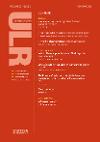Utilities Law Review - Volume 22 - Issue 5

Articles
How do you regulate an algorithm? A set of strawman remedies
Peter Church Linklaters
The impact of algorithms on society is attracting increasing attention. The proposal by the German Data Ethics Commission for risk-based regulation is just one of many legislative and regulatory initiatives. But how do you ‘regulate’ an algorithm? This article sets out a range of remedies and considers if they would work in practice.
Five principles for vertical merger enforcement policy
Jonathan B Baker, Nancy L Ross, Steven C Salop and Fiona Scott Morton
Georgetown University Law Center
There is a lot of discussion of major changes in antitrust law and policy in the US at present. Much of the talk can be dismissed as unrealistic promises made by some of the candidates for president in the upcoming election. However, there are serious proposals for change that are being considered by the Federal Trade Commission in a series of workshops and hearings that began in 2018 and continue in 2020. The proposed changes that have the most support among scholars involve vertical restraints on trade and proposed mergers of firms that have the potential to increase vertical restraints. US courts enforced prohibitions on many vertical restraints for decades. Over the last half century, however, members of the Chicago School of Economics persuaded US courts and enforcement agencies that most vertical restraints should be tolerated because they are either harmless or beneficial. Recent scholarship includes findings that some types of vertical restraints harm the performance of competitive markets in some important circumstances. In particular, vertical mergers in markets with high economies of scale can create formidable barriers to entry. The following article highlights the views of scholars who are leaders in the effort to reinvigorate concerns about the adverse effects of vertical mergers on the performance of markets. In a future issue we will publish an article that highlights proposed changes in antitrust law in another area that has attracted the attention of scholars and enforcement agencies. US antitrust law has long neglected the application of antitrust law to labour markets. There is increasing evidence that the large and growing gap between wages and labour productivity is attributable in large part to non-competitive labour markets. The increasing use of anti-poaching agreements among competitors and non-compete clauses in employment clauses has combined with recent scholarship to suggest the need for greater vigilance in enforcing antitrust law in labour markets. Both the US Department of Justice and the FTC have held workshops and hearings on those issues.
How is the electricity storage market developing?
Chris Towner, Simon Hughes and Sara Wex Womble Bond Dickinson LLP
Following a BEIS consultation, this article considers the options for energy storage and the applicable consenting routes. Following the low frequency demand disconnection on 9 August 2019, the question arises as to the amount of reserve ‘back up’ power required and how that will be supplied.
Case Comments
Ireland: The energy performance of buildings: the new regulations
Fidelma McManus and Sinead Grace Beauchamps
The authors review the key features of the new European Union (Energy Performance of Buildings) Regulations 2019 which commenced in Ireland on 1 November 2019. The article considers how the Regulations will impact on Ireland’s rental sector and Ireland’s long-term renovation strategy. It concludes with commentary on whether the Regulations go far enough to meet the government’s objective of upgrading 500,000 buildings to a B2 energy rating by 2030.
The Financial Conduct Authority finds three asset management firms in violation of the competition laws
Sharon Pang Deacons, Hong Kong
The UK’s Financial Conduct Authority (‘FCA’) issued its first formal ruling under its competition enforcement powers in May 2019 against three asset management companies for contravening the competition laws through the sharing of ‘strategic information’ during the book building process in relation to an IPO and a placing shortly before the books closed and the share prices were set. One of the three companies was granted immunity for reporting the infringement to the FCA, thus avoiding a pecuniary penalty. The other two companies were fined £306,300 and £108,600, respectively.
Landmark ruling of the CJEU on the validity of airport charges
Sebastian Bergenthal and Matthias Winter Bird & Bird
Airport charges are paid by airlines for the use of airport facilities. The Court of Justice of the European Union has now ruled that airport managing bodies must not apply airport charges on a discriminatory basis: reduced rates may be agreed individually with airlines, but the process and criteria must be transparent
Consumer focus
Resolver
James Walker
Resolver is an online platform to help consumers resolve issues with organisations in regulated and unregulated sectors. The service has helped millions of consumers to resolve £3.5 billion of issues in five years and has doubled in size each year. This article explores how consumers can be supported to be more effective at raising issues delivering better outcomes for consumers and businesses through the application of online dispute resolution techniques to the process of issue resolution
EU Current Survey
Energy – Telecommunications and Digital Economy – Transport
Edited by Peter Alexiadis and Christoph Raab Gibson, Dunn & Crutcher LLP, Brussels
UK Current Survey
Broadcasting – Energy – Telecommunications and Digital Economy – Transport – Water
Edited by Philippa Young
Solicitor, Oxford
